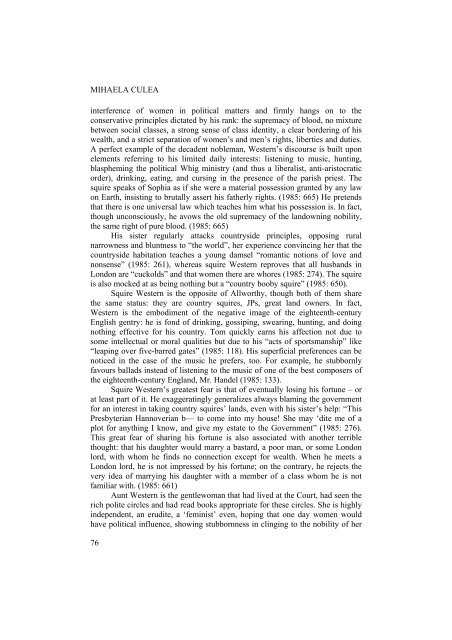culture, subculture and counterculture - Facultatea de Litere
culture, subculture and counterculture - Facultatea de Litere
culture, subculture and counterculture - Facultatea de Litere
You also want an ePaper? Increase the reach of your titles
YUMPU automatically turns print PDFs into web optimized ePapers that Google loves.
MIHAELA CULEA<br />
interference of women in political matters <strong>and</strong> firmly hangs on to the<br />
conservative principles dictated by his rank: the supremacy of blood, no mixture<br />
between social classes, a strong sense of class i<strong>de</strong>ntity, a clear bor<strong>de</strong>ring of his<br />
wealth, <strong>and</strong> a strict separation of women’s <strong>and</strong> men’s rights, liberties <strong>and</strong> duties.<br />
A perfect example of the <strong>de</strong>ca<strong>de</strong>nt nobleman, Western’s discourse is built upon<br />
elements referring to his limited daily interests: listening to music, hunting,<br />
blaspheming the political Whig ministry (<strong>and</strong> thus a liberalist, anti-aristocratic<br />
or<strong>de</strong>r), drinking, eating, <strong>and</strong> cursing in the presence of the parish priest. The<br />
squire speaks of Sophia as if she were a material possession granted by any law<br />
on Earth, insisting to brutally assert his fatherly rights. (1985: 665) He pretends<br />
that there is one universal law which teaches him what his possession is. In fact,<br />
though unconsciously, he avows the old supremacy of the l<strong>and</strong>owning nobility,<br />
the same right of pure blood. (1985: 665)<br />
His sister regularly attacks countrysi<strong>de</strong> principles, opposing rural<br />
narrowness <strong>and</strong> bluntness to “the world”, her experience convincing her that the<br />
countrysi<strong>de</strong> habitation teaches a young damsel “romantic notions of love <strong>and</strong><br />
nonsense” (1985: 261), whereas squire Western reproves that all husb<strong>and</strong>s in<br />
London are “cuckolds” <strong>and</strong> that women there are whores (1985: 274). The squire<br />
is also mocked at as being nothing but a “country booby squire” (1985: 650).<br />
Squire Western is the opposite of Allworthy, though both of them share<br />
the same status: they are country squires, JPs, great l<strong>and</strong> owners. In fact,<br />
Western is the embodiment of the negative image of the eighteenth-century<br />
English gentry: he is fond of drinking, gossiping, swearing, hunting, <strong>and</strong> doing<br />
nothing effective for his country. Tom quickly earns his affection not due to<br />
some intellectual or moral qualities but due to his “acts of sportsmanship” like<br />
“leaping over five-barred gates” (1985: 118). His superficial preferences can be<br />
noticed in the case of the music he prefers, too. For example, he stubbornly<br />
favours ballads instead of listening to the music of one of the best composers of<br />
the eighteenth-century Engl<strong>and</strong>, Mr. H<strong>and</strong>el (1985: 133).<br />
Squire Western’s greatest fear is that of eventually losing his fortune – or<br />
at least part of it. He exaggeratingly generalizes always blaming the government<br />
for an interest in taking country squires’ l<strong>and</strong>s, even with his sister’s help: “This<br />
Presbyterian Hannoverian b— to come into my house! She may ‘dite me of a<br />
plot for anything I know, <strong>and</strong> give my estate to the Government” (1985: 276).<br />
This great fear of sharing his fortune is also associated with another terrible<br />
thought: that his daughter would marry a bastard, a poor man, or some London<br />
lord, with whom he finds no connection except for wealth. When he meets a<br />
London lord, he is not impressed by his fortune; on the contrary, he rejects the<br />
very i<strong>de</strong>a of marrying his daughter with a member of a class whom he is not<br />
familiar with. (1985: 661)<br />
Aunt Western is the gentlewoman that had lived at the Court, had seen the<br />
rich polite circles <strong>and</strong> had read books appropriate for these circles. She is highly<br />
in<strong>de</strong>pen<strong>de</strong>nt, an erudite, a ‘feminist’ even, hoping that one day women would<br />
have political influence, showing stubbornness in clinging to the nobility of her<br />
76












